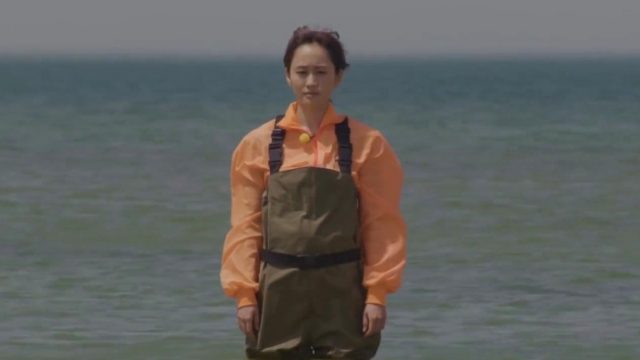
Atsuko Maeda is mesmerizing as a young woman trying to find her place in the world in To the Ends of the Earth
TO THE ENDS OF THE EARTH (Kiyoshi Kurosawa, 2019)
Metrograph Digital
December 11-17, $12
metrograph.com
www.kimstim.com
Kiyoshi Kurosawa’s To the Ends of the Earth is a gorgeously photographed, hauntingly meditative treatise on finding one’s place in the world. In her third film with Kurosawa following Seventh Code and Before We Vanish, former J-pop idol Atsuko Maeda of AKB48 fame is transcendent as Yoko, the host of a global travel show. She is making her way through Uzbekistan with her small crew — director Yoshioka (Shota Sometani), cameraman Iwao (Ryo Kase), production assistant Sasaki (Tokio Emoto), and translator Temur (Adiz Rajabov) — but the peppiness and determination she displays when being filmed is not repeated in real life, where she is quiet, lonely, and somber.
They head from Samarkand to Tashkent to Zaamin, from old cities to modern urban centers to the mountains and the sea, seeking out unusual and compelling stories, but not much is going well. At Lake Aydar on the hunt for the elusive bramul fish, a local fisherman refuses going out on the water with a woman. At an amusement park, a ride operator does not think she is strong enough to handle a fierce topsy-turvy spin. And a woman at a chaykhana won’t make her a proper plate of plov. But she soldiers on, doing whatever is necessary for the sake of the show, but it’s clear that her heart is no longer in it, if it ever was.
When she comes upon a goat tethered in a small pen in a back alley, she stops and says, “If I set that goat free in some grassy place, it’d be so happy.” Then, speaking directly to the goat, she asks, “What do you want?” It’s really a question she’s asking herself. Later she tells Iwao, “I feel like I’m moving away from what I really want to do.”
She rarely hangs out with the crew when they’re not filming. She eats by herself, is constantly late, does her own makeup and chooses her own clothing, and spends evenings alone in her hotel room, texting her firefighter boyfriend, who is in Tokyo, the only time she appears to experience any sort of genuine pleasure, but even that becomes problematic later on. When she is given a handheld video camera to take on her private adventures, she soon finds herself on the run from the law. Yoko is a kind of cross between Iris (Kati Outinen) in Aki Kaurismäki’s The Match Factory Girl, though not nearly as dark and pathetic, and Giulietta Masina in any of a number of Fellini films, sweet and innocent but hiding pain. The camera adores her face, as if it’s a character unto itself.
The film is filled with memorable images: Yoko standing waist-deep in the lake, lying flat on the floor of her hotel room, hiding from the police, trekking through sandy mountains, skittering through a sketchy underpass, and wandering into the empty Navoi Theater. It was made in conjunction with the twenty-fifth anniversary of the establishment of diplomatic relations between Japan and Uzbekistan and takes place along the Silk Road. Akiko Ashizawa’s cinematography of these little-seen landscapes is captivating, each shot composed like a unique work of art. Editor Koichi Takahashi’s pacing is mesmerizing, with immersive sound by Shinji Watanabe and understated music by Yusuke Hayashi.
Kurosawa is known for such gripping thrillers as Cure and Pulse as well as the elegiac Tokyo Sonata and the romantic drama Journey to the Shore; To the Ends of the Earth, which opens December 11 at Metrograph Digital, takes him to another level, highlighted by an unforgettable performance by Maeda in a film that is about filmmaking, about telling stories and acting them out in a fictitious world where, as in reality, life doesn’t always follow the script.